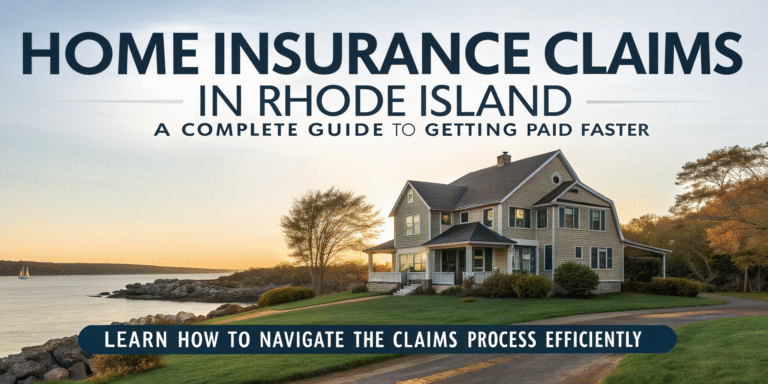Why Homeowners in Rhode Island Need to Understand Their Insurance Rights
Rhode Island may be the smallest state, but its weather—especially coastal storms and heavy snowfall—can pack a punch. When disaster strikes, filing a home insurance claim can help you recover from unexpected damage. But the process can be overwhelming, especially when insurers delay or dispute your claim. Knowing your rights and understanding the claims process is essential for maximizing your payout.
What Does Home Insurance Typically Cover in Rhode Island?
Homeowners insurance generally includes:
- Dwelling coverage: Protects the structure of your home.
- Personal property: Covers belongings inside the house.
- Liability protection: For injuries or damage to others on your property.
- Loss of use: Pays for hotel or rental if your home becomes uninhabitable.
- Other structures: Garages, fences, and sheds.
You may also need separate flood or hurricane insurance depending on your location, especially near the coast.
Read this: Attorney for Auto Insurance Dispute: How Legal Help Can Maximize Your Settlement
Common Types of Home Insurance Claims in Rhode Island
Some of the most common claims homeowners file include:
- Wind and hail damage
- Snow or ice damage
- Water damage from burst pipes or roof leaks
- Fire and smoke damage
- Theft or vandalism
- Fallen tree damage
Each type of claim may require different evidence, timelines, and forms, so it’s important to respond quickly and document everything.
Steps to File a Home Insurance Claim in Rhode Island
- Document the damage: Take photos and videos immediately.
- Prevent further damage: Use tarps, boards, or shut-off valves to stop worsening damage.
- Contact your insurer: Notify them promptly and file your claim.
- Meet with an adjuster: They will inspect the damage and estimate repair costs.
- Get repair estimates: Independent contractor quotes can help validate your claim.
- Review the offer: Insurers will offer a settlement—make sure it’s fair before accepting.
What If the Insurance Company Denies or Lowballs Your Claim?
Unfortunately, insurers sometimes act in bad faith. Common tactics include:
- Denying valid claims without proper explanation
- Offering less than the true repair cost
- Blaming damage on uncovered causes
- Delaying payment
If this happens, you should consult a home insurance claims attorney in Rhode Island who can negotiate or litigate on your behalf.
Read this: Car Accident Insurance Claims Attorney: What You Need to Know Before Filing
Role of a Home Insurance Claims Attorney in Rhode Island
A skilled lawyer can:
- Review your policy to determine full coverage
- Challenge wrongful denials or undervaluation
- Negotiate with the insurer for a higher payout
- Represent you in arbitration or court, if needed
In Rhode Island, bad faith insurance practices are taken seriously, and you may be entitled to additional compensation beyond the original claim.
Tips to Maximize Your Home Insurance Claim
- Keep detailed records: Include receipts, warranties, and photos of damaged items.
- Act quickly: Rhode Island law may set time limits on how soon you must file.
- Don’t rely solely on the insurer’s contractor: Get multiple repair estimates.
- Be cautious about recorded statements: These can be used against you.
Understanding the Deductible and Depreciation
Your claim amount may be reduced by:
- Deductible: The portion you pay before insurance kicks in.
- Depreciation: Age and wear-and-tear reduce payout value unless you have replacement cost coverage.
Ask your insurer to clarify if your policy pays actual cash value (ACV) or replacement cost value (RCV).
What Is Covered Under Hurricane and Flood Damage?
Standard policies usually exclude flood damage. If your home is near a body of water, consider adding:
- Flood insurance (via NFIP or private carrier)
- Hurricane deductible add-ons
Be sure to understand the terms and limitations of these policies before a storm hits.
Rhode Island Laws and Deadlines You Should Know
- Statute of limitations: You typically have 3 years to file a lawsuit related to an insurance dispute in RI.
- Fair Claims Settlement Practices Act: Protects homeowners from unfair insurer behavior.
If your insurance provider violates these laws, you may be eligible for penalties or further damages.
Frequently Asked Questions
Q: How long does a home insurance claim take to process? A: Usually 30–60 days, but it depends on the complexity of the claim and cooperation from both parties.
Q: Should I hire a public adjuster or attorney? A: A public adjuster helps assess damage, while an attorney can enforce your legal rights if your claim is denied or delayed.
Q: What if my policy doesn’t cover everything? A: Your lawyer can explore alternate sources of compensation and may dispute unfair exclusions.
Conclusion
If you’re a homeowner in Rhode Island facing an insurance dispute, don’t go it alone. Home insurance claims are complex, and insurance companies are not always on your side. Whether you’re dealing with storm damage, water issues, or a lowball offer, understanding the claims process—and working with a qualified attorney if needed—can help you recover faster and more fully. Know your rights, stay organized, and don’t hesitate to demand what you’re owed.


